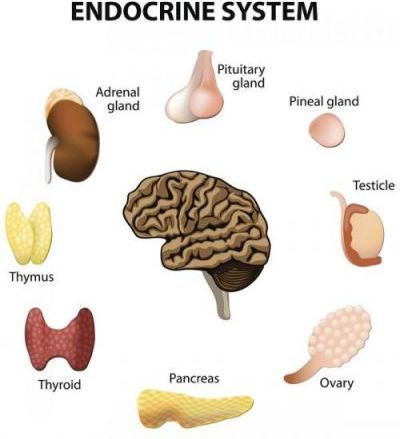Endocrinology (EDC)

Endocrinology (EDC)
Endocrinology (EDC) is the branch of medicine and biology focused on the endocrine system, its diseases, and the hormones produced by endocrine glands27. Hormones are chemical messengers released directly into the bloodstream by ductless glands, and they regulate a wide array of physiological processes-including growth, metabolism, reproduction, mood, sleep, and homeostasis124567.
Key Concepts
- Endocrine System: Composed of glands such as the pituitary, thyroid, parathyroid, adrenal glands, pancreas, ovaries, and testes. These glands secrete hormones that travel through the bloodstream to target organs, where they exert specific effects1257.
- Hormones: Can be peptides, steroids, or amino acid derivatives. They act on specific receptors either on the cell surface or inside target cells, influencing gene expression, enzyme activity, or cellular signaling137.
- Functions Regulated: The endocrine system coordinates and integrates cellular activity throughout the body, regulating:
Modes of Hormone Action
- Endocrine: Hormones act on distant target organs via the bloodstream.
- Paracrine: Hormones affect neighboring cells.
- Autocrine: Hormones act on the same cell that produced them.
- Neuroendocrine: Hormones are released into the blood by neurosecretory neurons137.
Endocrinology as a Medical Specialty
- Endocrinologists are doctors who specialize in diagnosing and treating hormone-related disorders, such as diabetes, thyroid disease, adrenal and pituitary disorders, metabolic syndrome, and reproductive endocrinology257.
- Diagnosis and management often rely heavily on laboratory testing of hormone levels, stimulation/suppression tests, and imaging of endocrine glands7.
- Endocrinology also includes subspecialties such as pediatric endocrinology, thyroid endocrinology, and reproductive endocrinology2.
Common Endocrine Disorders
- Diabetes mellitus
- Thyroid disorders (hypothyroidism, hyperthyroidism)
- Adrenal disorders (Addison’s disease, Cushing’s syndrome)
- Pituitary disorders (acromegaly, pituitary tumors)
- Parathyroid disorders (hyperparathyroidism, hypoparathyroidism)
- Polycystic ovary syndrome (PCOS)
- Osteoporosis27
Summary Table
| Aspect | Details |
|---|---|
| Definition | Study of the endocrine system, hormones, and related diseases |
| Major Glands | Pituitary, thyroid, parathyroid, adrenal, pancreas, ovaries, testes |
| Hormone Types | Peptides, steroids, amino acid derivatives |
| Regulated Functions | Growth, metabolism, reproduction, stress, homeostasis, mood |
| Specialist | Endocrinologist |
| Common Disorders | Diabetes, thyroid disease, adrenal/pituitary disorders, osteoporosis, PCOS |
Consult with Our Team of Experts Now!
At DrStemCellsThailand (DRSCT)‘s Anti-Aging and Regenerative Medicine Center of Thailand, we emphasize comprehensive evaluations and personalized treatment plans of Cellular Therapy and Stem Cells for managing various health conditions. If you have questions about Endocrinology or would like more information on our services, consult with our experts today!
Consult with Our Team of Experts Now!
References
- MSD Manuals: Overview of the Endocrine System
- Society for Endocrinology: What is Endocrinology?
- Basic Concepts of Endocrinology (PDF)
- US EPA: Overview of the Endocrine System
- Physicians Alliance of Connecticut: What is Endocrinology
- Advances in Physiology Education: Endocrinology Concepts for Medical Students
- Wikipedia: Endocrinology
Endocrinology is essential for understanding how hormones orchestrate the body’s complex functions and for diagnosing and treating a wide range of hormone-related diseases.















